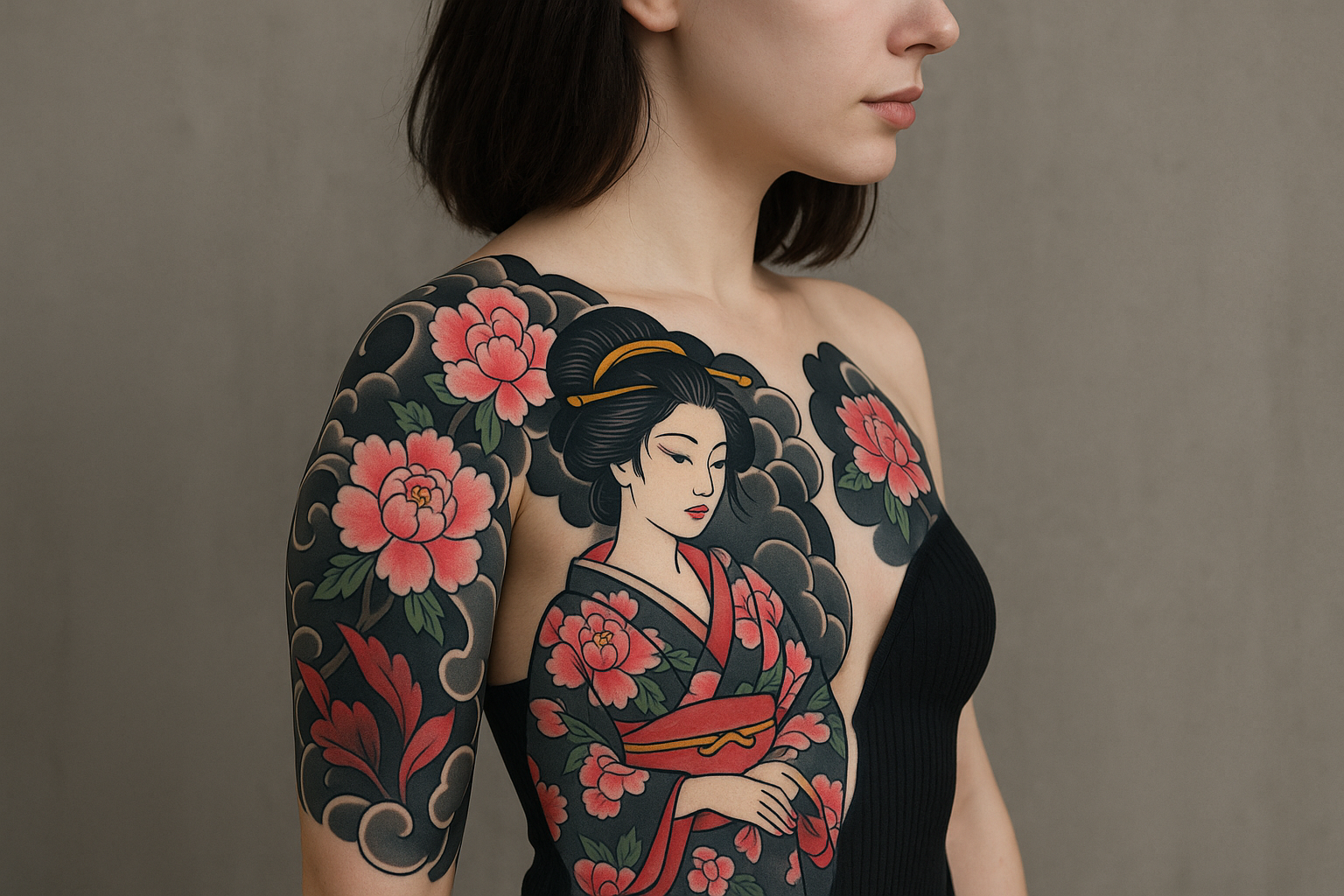It’s not about softening the dragon.
It’s about wearing it differently.
For centuries, traditional Japanese Irezumi was a man’s world—large back pieces, yakuza codes, symbols of strength inked in smoke and myth. But today, women are stepping into the legacy. Not by copying it. Not by shrinking it.
By reclaiming it.
This is the story of how feminine Irezumi isn’t about dilution—it’s about evolution.
💥 First, the Myth: Irezumi Wasn’t Meant for Women
Traditionally, Irezumi was tied to warriors, firemen, and gangsters. It was secret, spiritual, and subversive. Women were rarely the wearers—they were often the muses. Geisha. Ghosts. Temptresses. Hannya masks.
But we live in a new age now. Women are no longer just symbols in the story.
They are the story.
🔥 The Shift: Women Who Wear the Symbols, Not Just Embody Them
🐉 The Dragon
Once a symbol of masculine power, the dragon on a woman’s back now says:
“My strength doesn’t roar. It coils.”
Curved down a spine, wrapping a thigh—it’s not smaller. It’s strategic.
🥀 The Peony
Known as the “King of Flowers,” it’s lush, fearless, and beautiful—but when paired with a Hannya mask or tiger, it becomes something else:
A paradox. A warning. A weapon.
😈 The Hannya
She once stood for jealousy and wrath. But inked by modern women, she whispers:
“You thought rage made me unlovable. You were wrong.”
👁️ So, What Makes an Irezumi Tattoo Feminine (Without Making It Weak)?
Let’s be clear:
“Feminine” does not mean delicate.
It means power reimagined. Form shifted. Placement reowned.
Here’s how it shows up:
- Placement: Thighs, ribs, sternum, and back-of-neck become altars—private or public, depending on her terms.
- Flow: Traditional full-body suits become flowing half-sleeves, bold hip pieces, or chest panels that trace curves like armor.
- Narrative: Instead of just samurai and oni, women are tattooing their own folklore—witches, heartbreak, rebirth, lust, silence, survival.
🎙️ What Female Tattoo Artists Are Saying
We spoke to women in the Irezumi scene pushing boundaries, redefining power one piece at a time.
🔹 Naoko, Irezumi Artist in Kyoto
“Women’s Irezumi isn’t about making it softer. It’s about layering stories—pain, seduction, defiance. And the body tells it differently.”
🔹 Mira, LA-Based Neo-Japanese Tattooist
“We’re using the same elements: dragons, waves, tigers. But when a woman wears them, they bend. They breathe differently.”
👘 Feminine ≠ Submissive: Irezumi and Sexual Power
A backpiece showing bare skin isn’t vulnerability—it’s declaration.
A phoenix rising from the hip? Not just rebirth—it’s erotic control.
Women are using Irezumi not to please men—but to signal their survival, dominance, and sacred scars. It’s inked revenge. It’s quiet fire.
It’s lingerie and legacy, worn as one.
🖤 Why This Movement Matters
Because every woman told to “keep it cute,” “make it smaller,” or “don’t look too tough” is reclaiming her story in ink.
And Irezumi doesn’t just allow that—it amplifies it.
This isn’t a trend. It’s a return.
Not to the past, but to the root—before shame, before censorship.
👀 What to Consider Before Getting Feminine Irezumi
✅ Do Your Symbol Research: Know your koi from your kitsune. Meaning gives ink its voltage.
✅ Honor the Composition: Irezumi is visual storytelling. Don’t slap random elements together. Let them flow with your body.
✅ Choose a Compatible Artist: Not just someone who “can draw Japanese style,” but someone who understands balance, story, and your feminine fire.
📸 Image Suggestion:
A woman sitting sideways, robe falling off one shoulder, revealing a floral Hannya mask between waves and peonies wrapping her shoulder blade.
Overlay text:
“I Wear Beauty Like a Warning.”
🛍️ Want to Feel the Power Without the Needle?
Explore our Irezumi-inspired tees, infused with Hannya mystery, dragon heat, and quiet erotic rebellion.
Designed for women who don’t ask permission before rising.
👉 Browse Feminine Irezumi Tees →
✨ Your Ink Is a Spell. Cast It Bold.
Whether you wear it on your skin or your shirt, Irezumi isn’t just art—it’s armor.
And you don’t have to sacrifice your femininity to wear it. You just have to own it differently.
The dragon belongs on your skin, if it’s been sleeping in your soul.


Leave a comment
Your email address will not be published. Required fields are marked *
You must be logged in to post a comment.